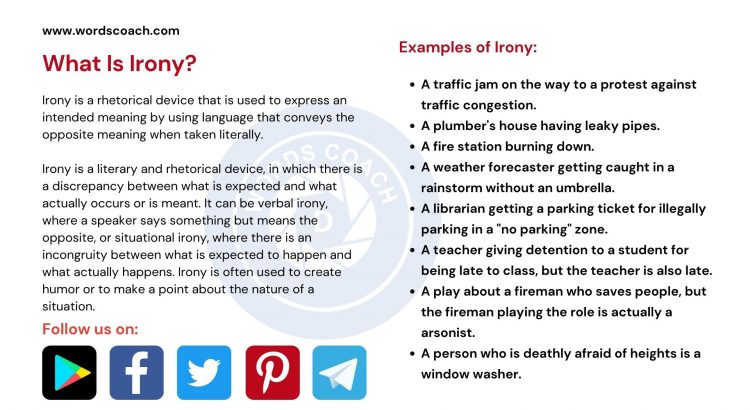What Is Irony?
Irony is a rhetorical device that is used to express an intended meaning by using language that conveys the opposite meaning when taken literally.
Irony is a literary and rhetorical device, in which there is a discrepancy between what is expected and what actually occurs or is meant. It can be verbal irony, where a speaker says something but means the opposite, or situational irony, where there is an incongruity between what is expected to happen and what actually happens. Irony is often used to create humor or to make a point about the nature of a situation.
The Different Types of Irony
There are several types of irony, including:
- Verbal irony: This occurs when a speaker says something but actually means the opposite. For example, if someone says “What a beautiful day!” when it is raining and gloomy, that would be verbal irony.
- Situational irony: This occurs when there is a discrepancy between what is expected to happen and what actually happens. For example, a fire station burning down is an example of situational irony.
- Dramatic irony: This occurs when the audience knows something that the characters in a play, movie, or story do not. This creates a sense of tension or suspense because the audience knows what is going to happen, but the characters do not.
- Cosmic irony: This refers to an event in which the opposite of what is expected happens, and the outcome is opposite of what was intended, and is often seen as the result of fate or divine intervention.
- Socratic irony: This is when a person pretends to be ignorant in order to draw out information or a confession from someone else.
- Irony of fate: This is when an event happens that goes against what was intended or expected, and is often seen as a result of fate or divine intervention.
Why Use Irony?
- The first reason behind using irony is to emphasise a point that requires attention or the one that indicates a noticeable change in the character or plot.
- The next reason would be to make the readers pause for a second and think about what the author is actually trying to convey.
- Another reason is to depict the variance between what is happening, how everything at the moment occurs and what had been expected of the characters or the plot.
- Also, to induce a tone of sarcasm through the characters’ lines or the narrator’s description.
Examples of Irony
Here are some examples of irony:
- A traffic jam on the way to a protest against traffic congestion.
- A plumber’s house having leaky pipes.
- A fire station burning down.
- A weather forecaster getting caught in a rainstorm without an umbrella.
- A librarian getting a parking ticket for illegally parking in a “no parking” zone.
- A teacher giving detention to a student for being late to class, but the teacher is also late.
- A play about a fireman who saves people, but the fireman playing the role is actually a arsonist.
- A person who is deathly afraid of heights is a window washer.
- A teacher who hates a lot of coffee is giving a lecture about the negative effects of caffeine on the body.
- A ironic song “Ironic” by Alanis Morissette where the examples of irony in the song are not actually ironic.


